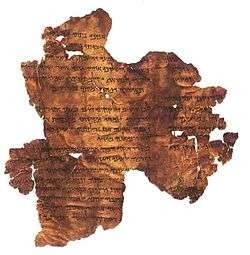Hosea 9
| Hosea 9 | |
|---|---|
 4Q166 "The Hosea Commentary Scroll", late first century B.C. | |
| Book | Book of Hosea |
| Bible part | Old Testament |
| Order in the Bible part | 28 |
| Category | Nevi'im |
Hosea 9 is the ninth chapter of the Book of Hosea in the Hebrew Bible or the Old Testament of the Christian Bible.[1][2] This chapter contains the prophecies spoken by the prophet Hosea son of Beeri, about the distress and captivity of Israel for their sins, especially their idolatry.[3] It is a part of the Book of the Twelve Minor Prophets.[4][5]
Text
- The original text is written in Hebrew language.
- This chapter is divided into 14 verses.
Textual versions
Some most ancient manuscripts containing this chapter in Hebrew language:
- Masoretic Text (10th century)
- Dead Sea Scrolls: (2nd century BC)[6][7]
- 4Q82 (4QXIIg): extant: verses 1‑4, 9‑17[6]
Ancient translations in Koine Greek:
- Septuagint (3rd century BC)
- Theodotion version (~AD 180)
Structure
NKJV groups this chapter into:
- Hosea 9:1-17 = Judgment of Israel's Sin
Verse 9
- They have deeply corrupted themselves,
- as in the days of Gibeah:
- therefore he will remember their iniquity,
- he will visit their sins.[8]
- "As in, the days of Gibeah": When Benjamin espoused the cause of "the children of Belial" who had worked such horrible brutishness in Gibeah toward the concubine of the Levite. This they maintained with such obstinacy, that, through God's judgment, the whole tribe perished, except six hundred men. Deeply they must have already corrupted themselves, who supported such guilt. Such corruption and such obstinacy was theirs still.[9] See Judges 19.[3]
Verse 11
- As for Ephraim, their glory shall fly away like a bird,
- from the birth, and from the womb, and from the conception.[10]
- " As for Ephraim, their glory shall fly away like a bird": The greatest glory, perhaps, of Ephraim was their fruitfulness - "double fruitfulness" being the very meaning of the name and the multiplication of their numbers; now that glory of populousness was to vanish speedily and entirely, like birds winging their way swiftly and out of sight. After the figure comes the fact, and it is expressed in anti-climactic form - no child-bearing, no pregnancy, no conception. The course of barrenness takes the place of the blessing of fruitfulness. Though they bring up their children, yet will I believe them, that there shall not be a man left. Even if their sons should grow up to manhood and attain maturity, yet they would be cut off by the sword and swept away by death, so that their progeny would perish. This accords with the threatened punishment of unfaithfulness recorded in Deuteronomy 32:25, "The sword without, and terror within, shall destroy both the young man and the virgin, the suckling also with the man of grey hairs." The negative sense of rain, equivalent to "so that not," is common before verbs, also before nouns the min being put for the fuller מֵהְיות.[11]
- "from the birth, and from the womb, and from the conception": that is, some of them, as soon as they were born; others while in the womb, being abortives; or, however, when they should, or as soon as they did, come from thence; and others, as soon as conceived, never come to any thing; or not conceived at all, as Kimchi interprets it, "the women being barren".[12]
See also
- Related Bible parts: Numbers 25, Judges 19, Hosea 6, Hosea 7, Hosea 8
Notes and references
- ↑ Halley, Henry H. Halley's Bible Handbook: an abbreviated Bible commentary. 23rd edition. Zondervan Publishing House. 1963.
- ↑ Holman Illustrated Bible Handbook. Holman Bible Publishers, Nashville, Tennessee. 2012.
- 1 2 Robert Jamieson, Andrew Robert Fausset; David Brown. Jamieson, Fausset, and Brown's Commentary On the Whole Bible. 1871.

- ↑ Metzger, Bruce M., et al. The Oxford Companion to the Bible. New York: Oxford University Press, 1993.
- ↑ Keck, Leander E. 1996. The New Interpreter's Bible: Volume: VII. Nashville: Abingdon.
- 1 2 Dead sea scrolls - Hosea
- ↑ Timothy A. J. Jull; Douglas J. Donahue; Magen Broshi; Emanuel Tov (1995). "Radiocarbon Dating of Scrolls and Linen Fragments from the Judean Desert". Radiocarbon. 38 (1): 14. Retrieved 26 November 2014.
- ↑ Hosea 9:9
- ↑ Barnes, Albert. Notes on the Old Testament. London, Blackie & Son, 1884. Reprint, Grand Rapids: Baker Books, 1998.

- ↑ Hosea 9:11
- ↑ Joseph S. Exell; Henry Donald Maurice Spence-Jones (Editors). The Pulpit Commentary. 23 volumes. First publication: 1890.

- ↑ John Gill. John Gill's Exposition of the Entire Bible. Exposition of the Old and New Testament. Published in 1746-1763.

Bibliography
- Collins, John J. (2014). Introduction to the Hebrew Scriptures. Fortress Press.
- Hayes, Christine (2015). Introduction to the Bible. Yale University Press.
External links
Jewish
Christian
This article is issued from
Wikipedia.
The text is licensed under Creative Commons - Attribution - Sharealike.
Additional terms may apply for the media files.